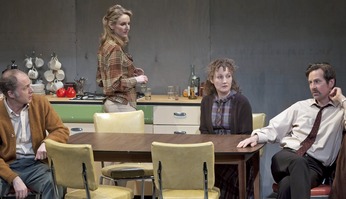SITE GUIDE
SEARCH
REVIEWS
REVIEW ARCHIVES
ADVERTISING AT CURTAINUP
FEATURES
NEWS
Etcetera and
Short Term Listings
LISTINGS
Broadway
Off-Broadway
NYC Restaurants
BOOKS and CDs
OTHER PLACES
Berkshires
London
California
New Jersey
DC
Connecticut
Philadelphia
Elsewhere
QUOTES
TKTS
PLAYWRIGHTS' ALBUMS
LETTERS TO EDITOR
FILM
LINKS
MISCELLANEOUS
Free Updates
Masthead
A CurtainUp Review
Benefactors
By Elyse Sommer
|
The Basuto Road scheme included our very successful redevelopment of Colin and Sheila. . .A twilight area. That's what Colin and Sheila were when we started work on them. They were Like Basuto Road — full of geological faults. We got them stood up in the sunlight.— David. As for David's dream of a total change for the dreary Basutoland area, it evolves into the kind of changes that according to his wife Jane marked the beginning of when people like her and David ceased to believe in change.
|

Daniel Jenkins, Vivienne Benesch, Deanne Lorette and Stephen Barker Turner;
(Photo: Richard Termine)
|
Besides some fine new plays both on and Off-Broadway, the menu of revivals includes two plays showcasing the dazzling intelligence and dexterity with wordplay and dramatic structure of two of Great Britain's most respected living playwrights — Tom Stoppard's Arcadia (1995) and Michael Frayn's Benefactors (1984). The Stoppard revival is a high profile Broadway production. Benefactors also came to New York at a Broadway theater, where it nabbed a Tony and featured Glenn Close and Sam Waterston as the couple in whose kitchen it took place. But the Keen Company's more modest Off-Broadway revival is well worth checking out.
Benfactors is as smartly constracted as Frayn's farcical masterpiece Noises Off as well as Copenhagen, and like the latter more serious and also history linked. Though the Thatcher administration, which was at the height of its power in the '80s is long gone, this revival is quite timely, depressingly so. It not only stirs memories of 9/11 but also echoes the current Recession and the focus of conservative politicians gungho about cutting costs and getting the government out of business and industry.
Unlike Arcadia with its two almost 200 years apart story lines and characters, Benefactors sticks with the same four people: David (Daniel Jenkins), an up and coming visionary architect. . . his wife Jane (Vivienne Benesch), a super mom who uses her training as an archeologist to help him with his projects. . . Colin (Stephen Barker Turner), a journalist who went to the same college as David and his wife Sheila (Deanne Lorette), who spend more time in their house than their own. These four characters take turns with direct address monologues that take us back to the events of their interlocking lives between 1966 and 1972, their flashbacks from the vantage point of 1984. The central dramatic arc focuses on a commission to redevelop a lower class neighborhood to be executed by David.
The ups and downs besetting David's vision for revitalizing Basuto Road — so named in 1890 when Great Britain had just annexed Basutoland and "East Africa was as new as outer space" — are intermingled with Jane and David's increasingly complex relationship with Sheila and Colin, as well as changes in their own marriage.
To the happily married and upwardly mobile architect and his supportive spouse, Sheila and Colin need to be rescued from their drab, dysfunctional existence as much the Basuto Road neighborhood. David and Jane's efforts to be benefactors to their friends as well as an entire community — not to mention Colin's aggressive opposition — makes for a play that's a commentary about a period when big dreams were dashed by the disillusioning reality of bottom line oriented governance In addition it explores how external events can affect marriages and friendships, and raise doubts about the selfish and destructive underside of good deeds.
Clearly this is not a play about urban renewal — though David's inspiration to turn the shrinking of available land into an exciting mix of conventional houses and two 50-story skyscrapers is a major source of the plot complications — but neither is the subtext about the inter-relationships of its characters your typical marital drama. There are extramarital tensions, but don't expect a traditional love triangle. After all David, the character who causes Sheila and Colin's feelings to spin out of control, and even tests Jane's commitment to be on whatever side he's on, is too much in his own self-absorbed world to be looking for romance. He's totally involved with trying to adjust to the reality that work like his is subject to practical considerations — a reality that prompts his pained sum-up of his architectural dreamscape: "It's not art. It's mathematics."
Mr. Frayn has fashioned his play as if he too were an architect constructing a huge development, but skillful and elegant writer that he is, he has managed to make his multi-faceted, wittily scripted drama fit the modest space of David and Jane's kitchen. The audience addressing flashback monologues subtly show the daily lives in that kitchen going through increasingly tumultuous changes. The shifts from the decade after the life and attitutde changing years during which the Basuto Road project metamorphoses from uplifting vision to disillusioning compromise naturally calls for emotionally convincing performances. Fortunately, under Carl Forsman's direction, the four actors in the Keen production, especially the women, turn in finely modulated performances with consistent English accents.
Vivienne Bensesch sensitively portrays the unflappapable and loving Jane, letting her darker side surface at an exactly right gradual pace. Deanne Lorette is also excellent as the former nurse whose cruelly unloving husband has robbed her of self esteem and the ability to cope with him or her children. As we see her become more independent thanks to Jane's persuading David to hire her as his secretary, her love-smitten, over eager to please, fawning intensity is so convincing that it tends to irritate us. It also makes us understand the tenaciousness of her need to appease rather than stand up to Colin which leads to her betraying her benefactors.
The production values are servicable but basic, in keeping with the small black box venue. Unfortunately, despite its modest size, the Clurman Theater's wide stage makes those sitting at the far right and in the two front rows prone to uncomfortable neck twisting. In this production, with the kitchen set positioned at the left side of the stage that the audience faces, those sitting at the opposite side never have the close-up view that makes an intimate space like this so appealing. Other than putting a chair at that side for several scenes in Colin and Sheila's living room, Mr. Forsman, instead of figuring out a way to spread the action more to the center of the stage, has chosen to keep the action focused on the kitchen set.
If this play with its tower designing architect reminds you of Ibsen's The Master Builder, Mr. Frayn would hardly disagree with you. He has, in fact, included a direct reference to that play in his script via Colin's sly "What was that girl in in Ibsen called — the one who makes the old boy climb up the scaffolding?" Yet, by the time this architect is finished with his project, not triumphantly but as a survivor in a world with little room for visionary changes, Benefactors is less kin to Ibsen than Chekhov whose work the versatile Mr. Frayn (besides plays, he's written numerous novels and most recently a memoir about his father) has translated four times.
Unless this production is extended, you have just the rest of this month to enjoy this still pertinent personal and social drama.
|
Benefactor by Michael Frayns Directed by Carl Forsman Cast: Vivienne Benesch (Jane), Daniel Jenkins (David), Deanne Lorette (Sheila), Stephen Barker Turner (Kevin) Set: Dane Laffrey Lighting: Josh Bradford Costumes: Jennifer Paar Sound: Will Pickens Stage Manager: Jeff Meyers Running Time: Approx. 2 hours with 1 intermission Keen Company at the Clurman Theatre 410 West 42nd Street 212/239-6200 www.keencompany.org. C's play. From 3/22/11; opening 4/05/11; closing 4/30/11. Tuesday at 7pm; Wednesday through Friday evenings at 8pm; Saturdays at 2pm & 8pm; and Sunday matinees at 3pm. Tickets, $59.75 Reviewed by Elyse Sommer at April1st press preview |
|
REVIEW FEEDBACK Highlight one of the responses below and click "copy" or"CTRL+C"
Paste the highlighted text into the subject line (CTRL+ V): Feel free to add detailed comments in the body of the email. . .also the names and emails of any friends to whom you'd like us to forward a copy of this review. Visit Curtainup's Blog Annex For a feed to reviews and features as they are posted add http://curtainupnewlinks.blogspot.com to your reader Curtainup at Facebook . . . Curtainup at Twitter Subscribe to our FREE email updates: E-mail: esommer@curtainup.comesommer@curtainup.com put SUBSCRIBE CURTAINUP EMAIL UPDATE in the subject line and your full name and email address in the body of the message. If you can spare a minute, tell us how you came to CurtainUp and from what part of the country. |

Slings & Arrows-the complete set
You don't have to be a Shakespeare aficionado to love all 21 episodes of this hilarious and moving Canadian TV series about a fictional Shakespeare Company






